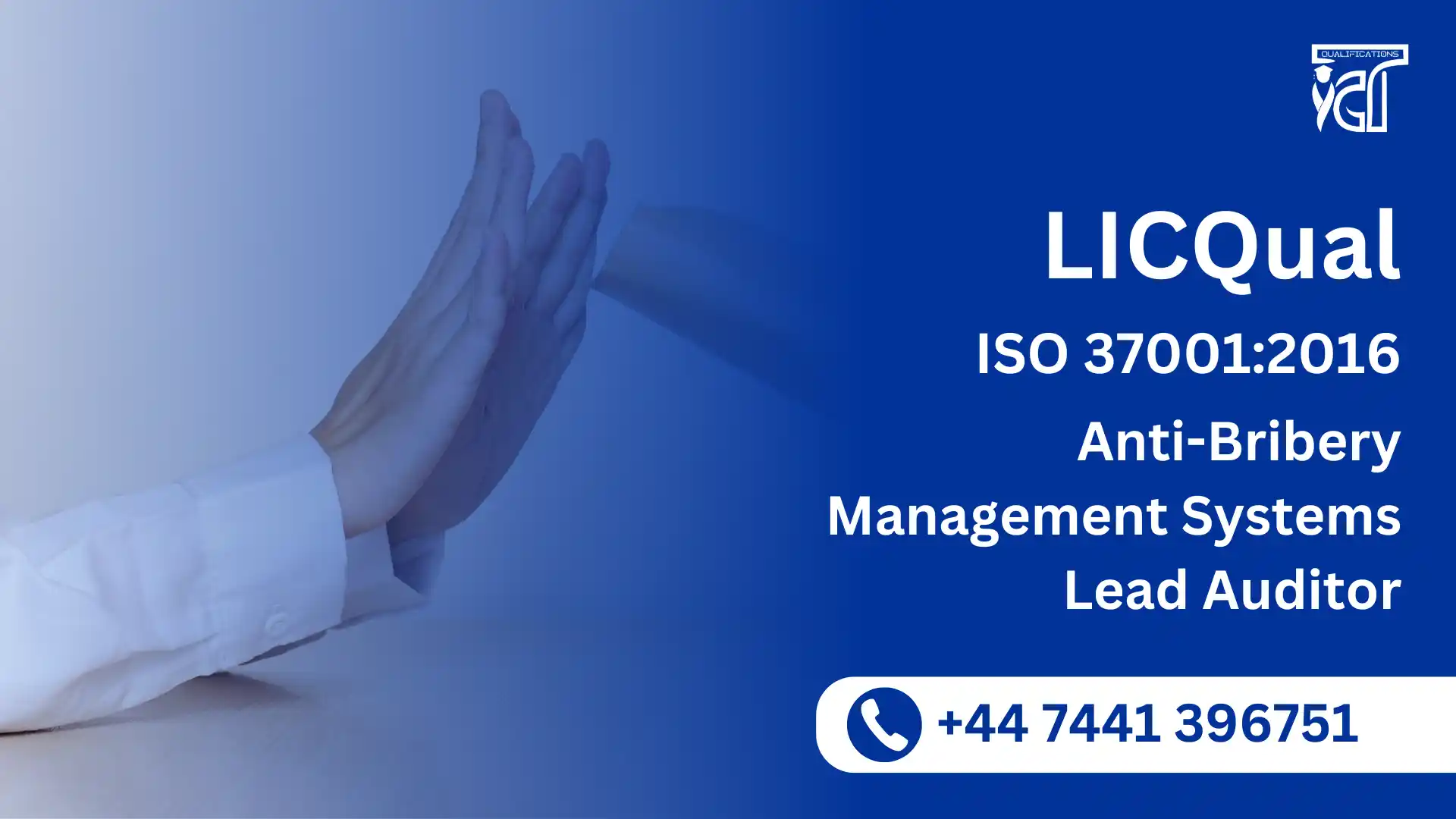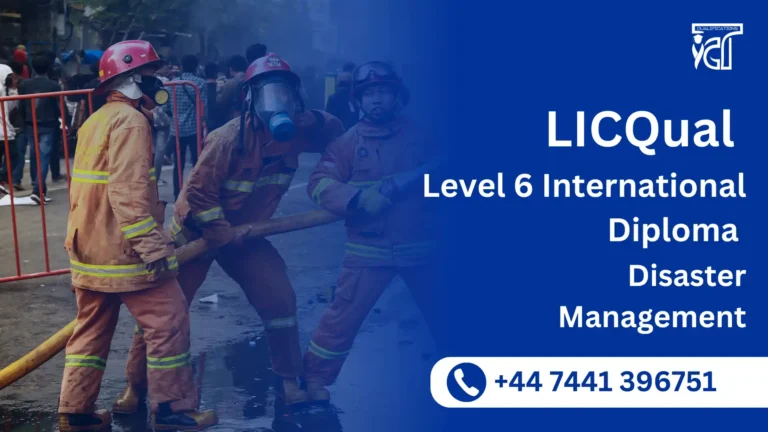The LICQual ISO 37001:2016 Anti-Bribery Management Systems Lead Auditor course is designed to equip professionals with the essential knowledge and practical skills required to perform first, second, and third-party audits of Anti-Bribery Management Systems (ABMS) against the ISO 37001:2016 standard. This comprehensive training program enables participants to understand the principles of anti-bribery management, identify bribery risks, assess control measures, and lead audits that ensure compliance with international best practices.
Throughout the LICQual ISO 37001:2016 Anti-Bribery Management Systems Lead Auditor, learners will gain in-depth insight into the structure, requirements, and implementation of ISO 37001:2016. The program emphasizes the development of auditing expertise—covering audit planning, execution, reporting, and follow-up—aligned with ISO 19011 and ISO/IEC 17021-1 guidelines. It is ideal for professionals seeking to enhance organizational transparency, build stakeholder confidence, and contribute to a culture of ethical governance.
This globally recognized qualification empowers individuals to take leadership roles in audit teams, ensuring that anti-bribery measures are properly integrated into an organization’s management system to prevent, detect, and address bribery risks across various sectors and industries.
LICQual ISO 37001:2016 Anti-Bribery Management Systems Lead Auditor
Following are the mandatory units of LICQual ISO 20121:2024 Event Sustainability Management Systems:
| Unit Ref# | Unit Title | Credit | GLH |
| LICQ2200103-1 | Introduction to Anti-Bribery Management Systems | 8 | 24 |
| LICQ2200103-2 | Overview of ISO 37001: Key Concepts and Requirements | 8 | 24 |
| LICQ2200103-3 | Establishing an ABMS: Policies, Procedures, and Controls | 6 | 18 |
| LICQ2200103-4 | Risk Assessment and Due Diligence Processes | 6 | 18 |
| LICQ2200103-5 | Implementing Anti-Bribery Training and Awareness Programs | 6 | 18 |
| LICQ2200103-6 | Monitoring, Measurement, and Continuous Improvement | 6 | 18 |
GLH (Guided Learning Hours) and TQT (Total Qualification Time) are terms commonly used in vocational qualifications to help define the amount of time a learner is expected to spend on their studies.
1. GLH (Guided Learning Hours)
GLH refers to the number of hours a learner spends being directly taught, supervised, or supported during their course. This includes the time spent in activities such as:
- Classroom instruction
- Practical workshops
- One-on-one tutoring or mentoring sessions
- Online learning sessions with tutor support
In other words, GLH represents the time that learners are actively engaged with their instructors or learning activities.
2. TQT (Total Qualification Time)
TQT represents the total amount of time a learner is expected to invest in completing a qualification, including:
- GLH (Guided Learning Hours): Time spent on direct learning, as explained above.
- Self-Directed Learning: This includes time spent on independent study, research, assignment completion, preparation for exams, and any other work the learner does outside of direct teaching hours.
TQT is a broader measure that includes all the time required to achieve the qualification. It helps learners and employers understand the overall commitment required for the qualification.
Key Differences Between GLH and TQT:
- GLH focuses on direct learning with guidance or supervision.
- TQT includes GLH as well as independent study time and other learning-related activities.
Example:
If a qualification has a TQT of 600 hours and a GLH of 250 hours, it means the learner should spend 250 hours in direct learning (classroom, online, or tutor-led sessions) and 350 hours on independent study or research.
By the end of this course, learners will be able to:
Introduction to Anti-Bribery Management Systems
Upon completion of this unit, learners will be able to:
- Understand the importance and role of Anti-Bribery Management Systems (ABMS) in promoting ethical business practices.
- Define bribery, corruption, and related risks in a business context.
- Identify the components and objectives of an ABMS and explain how they help organizations prevent and address bribery.
- Recognize the global impact of anti-bribery regulations and the significance of an ABMS for organizational integrity.
Overview of ISO 37001: Key Concepts and Requirements
By the end of this unit, learners will be able to:
- Interpret the key concepts and clauses of the ISO 37001:2016 standard.
- Understand the core requirements of ISO 37001, including leadership, planning, risk management, and compliance.
- Assess how ISO 37001 applies to different organizational structures and industries.
- Recognize the legal and regulatory obligations that organizations must adhere to under the ISO 37001 framework.
Establishing an ABMS: Policies, Procedures, and Controls
After completing this unit, learners will be able to:
- Develop and implement anti-bribery policies, procedures, and controls that align with ISO 37001 standards.
- Understand the role of management commitment in the establishment of a robust ABMS.
- Identify key internal and external factors that influence the development of effective anti-bribery systems.
- Create a system for monitoring and maintaining the effectiveness of the policies and procedures.
Risk Assessment and Due Diligence Processes
Upon successful completion of this unit, learners will be able to:
- Conduct comprehensive risk assessments to identify potential bribery risks within an organization.
- Develop effective due diligence processes for evaluating third-party relationships, including suppliers, partners, and contractors.
- Apply ISO 37001’s risk management framework to assess and mitigate bribery-related risks.
- Understand how to document and report risks and findings in accordance with ISO 37001 requirements.
Implementing Anti-Bribery Training and Awareness Programs
By the end of this unit, learners will be able to:
- Design and implement effective anti-bribery training programs for employees and stakeholders.
- Promote awareness of bribery risks and the organization’s anti-bribery policies.
- Measure the effectiveness of training programs and adjust strategies based on feedback and audit findings.
- Foster a culture of integrity within the organization through continuous education and communication.
Monitoring, Measurement, and Continuous Improvement
After completing this unit, learners will be able to:
- Understand the importance of monitoring and measuring the effectiveness of an ABMS.
- Identify and use key performance indicators (KPIs) and other metrics to track the performance of anti-bribery efforts.
- Conduct internal audits to evaluate the ABMS’s effectiveness and compliance with ISO 37001.
- Implement a continuous improvement process to enhance anti-bribery policies and controls in response to audit results and evolving risks.
Key Benefits of the LICQual ISO 37001:2016 Anti-Bribery Management Systems Lead Auditor
- Comprehensive Understanding of ISO 37001:2016
Gain in-depth knowledge of the ISO 37001:2016 standard, its structure, requirements, and practical application within organizations. - Enhanced Auditing Skills
Develop the competence to plan, conduct, report, and follow up on anti-bribery management system audits in accordance with ISO 19011 and ISO/IEC 17021-1. - Leadership in Audit Teams
Learn how to lead audit teams effectively and manage the entire auditing process, including risk assessment, evidence collection, and audit reporting. - Promotion of Ethical Business Practices
Contribute to the establishment of a strong anti-bribery culture in organizations, improving corporate governance, stakeholder trust, and regulatory compliance. - Career Advancement Opportunities
Strengthen your professional profile and open new career pathways in compliance, risk management, auditing, and corporate governance across various sectors. - Global Recognition
Achieve an internationally recognized certification that demonstrates your expertise and capability to assess and improve anti-bribery management systems worldwide. - Practical, Real-World Knowledge
Gain hands-on experience through practical audit exercises, real-life case studies, and scenarios that prepare you for real auditing challenges. - Support for Organizational Compliance
Equip your organization with the tools to prevent, detect, and respond effectively to bribery risks, thus minimizing legal, financial, and reputational risks. - Improved Risk Management
Learn to identify and evaluate bribery risks within business processes, enabling proactive risk mitigation strategies. - Compliance with International Standards
Ensure that organizations meet global anti-bribery legal and regulatory requirements, enhancing their credibility in international markets.
Ideal Learner: LICQual ISO 37001:2016 Anti-Bribery Management Systems Lead Auditor
This course is ideally suited for:
- Experienced Auditors
Professionals with prior knowledge or experience in auditing management systems who wish to specialize in anti-bribery management audits. - Compliance and Risk Management Officers
Individuals responsible for developing, implementing, or maintaining anti-bribery controls and corporate governance frameworks within their organizations. - Internal Auditors
Those tasked with conducting internal audits of anti-bribery management systems seeking to enhance their skills to a lead auditor level. - Corporate Ethics and Governance Professionals
Personnel involved in corporate ethics, integrity, or governance roles looking to strengthen their organization’s compliance with anti-bribery standards. - Consultants and Advisors
Management system consultants providing advisory services in the design and implementation of Anti-Bribery Management Systems (ABMS). - Senior Managers and Executives
Decision-makers aiming to understand anti-bribery risks and the importance of robust compliance mechanisms to protect organizational reputation and value. - Legal and Regulatory Professionals
Lawyers, legal advisors, and regulatory compliance officers interested in expanding their understanding of anti-bribery frameworks and audit procedures. - Anyone Seeking Lead Auditor Certification
Individuals who wish to pursue a recognized qualification as a certified Lead Auditor for ISO 37001:2016, to advance their professional auditing career.
Entry Requirements
Register Now
Qualification Process
Qualification Process for the LICQual ISO 37001:2016 Anti-Bribery Management Systems Lead Auditor
- Self-Assessment:
Begin by evaluating your eligibility to ensure you meet the qualification requirements, including work experience, knowledge, and language proficiency. - Registration:
Complete your registration by submitting the required documents, including a scanned copy of a valid ID, and paying the registration fee. - Induction:
An assessor will conduct an induction to confirm your eligibility for the course and explain the evidence requirements. If you do not meet the criteria, your registration will be canceled, and the fee will be refunded. - Assignmnets & Evidence Submission:
Provide all assignmnets and the necessary evidence based on the assessment criteria outlined in the course. If you are unsure of the required evidence, consult with the assessor for guidance on the type and nature of evidence needed. - Feedback and Revision:
The assessor will review your submitted evidence and provide feedback. Evidence that meets the criteria will be marked as “Criteria Met,” while any gaps will be identified. You will be asked to revise and resubmit if needed. - Competence Evidence:
Submit final evidence demonstrating that all learning outcomes have been met. This evidence will be marked as “Criteria Met” by the assessor once it is satisfactory. - Internal Quality Assurance (IQA):
The Internal Quality Assurance Verifier (IQA) will review your evidence to ensure consistency, quality, and compliance with standards. - External Verification:
The IQA will submit your portfolio to LICQual External Quality Assurance Verifiers (EQA) for final confirmation. The EQA may contact you directly to verify the authenticity of your evidence. - Certification:
Upon successful completion of all checks, LICQual will issue your official certificate, confirming that you have attained the LICQual ISO 37001:2016 Anti-Bribery Management Systems Lead Auditor.







